|
|
|
Sort Order |
|
|
|
Items / Page
|
|
|
|
|
|
|
| Srl | Item |
| 1 |
ID:
095301
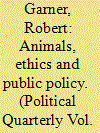

|
|
|
|
|
| Publication |
2010.
|
| Summary/Abstract |
In orthodox moral thinking in the West, animals count for something but human interests take precedence. It is argued that this moral orthodoxy or animal welfare position is flawed. It fails to take into account that some animals, like humans, are persons and that some, so-called 'marginal' humans lack personhood. More importantly, although it is likely that animals do not have an interest in liberty for its own sake and have less of an interest in continued life than humans, there is little justification for the animal welfare claim that an animal's suffering should be regarded as less important morally than that of a human. It is concluded that the adoption of a 'sentiency position', whereby animals have a right not to suffer, has radical implications for the way animals are treated, ruling out intensive forms of animal agriculture and those scientific procedures that inflict suffering as morally illegitimate.
|
|
|
|
|
|
|
|
|
|
|
|
|
|
|
|
| 2 |
ID:
185595
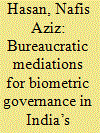

|
|
|
|
|
| Summary/Abstract |
Interrogating Aadhaar, India’s biometric ID project for its billion-plus residents, in the small north-eastern state of Tripura, where it first achieved high levels of acceptance, reveals that ‘success’ at enrolments into the database was dependent on the subversion of its celebrated biometric potentials by a local mediating bureaucracy. By limiting enrolments to previously documented subjects and enrolling Aadhaar into an ongoing regional situation of strife and reconciliation, the work of the bureaucracy highlights the contextual, territorial conditions of securitisation within which a biometric database takes shape. This paper aims to challenge claims about Aadhaar as an emblematic case of biometric governance ushering in a ‘new’ state, instead suggesting linkages with existing forms of state practices and ongoing state projects.
|
|
|
|
|
|
|
|
|
|
|
|
|
|
|
|
| 3 |
ID:
174201
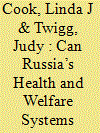

|
|
|
|
|
| Summary/Abstract |
The COVID-19 pandemic has tested the preparedness of Russia’s public health system to respond to a nationwide crisis, and the ability of its broader welfare state to cushion the population against the economic impacts. This essay puts these developments in the context of recent reforms of the health care and welfare systems, showing how they affected the population’s vulnerability to the pandemic’s health and economic shocks, and the government’s ability to manage both.
|
|
|
|
|
|
|
|
|
|
|
|
|
|
|
|
| 4 |
ID:
177162
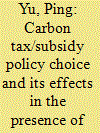

|
|
|
|
|
| Summary/Abstract |
Interest groups, such as industry organization, public finance and environmental group, may exert influences on policy makers when they are choosing environmental policies. Considering the situation that two countries, where a domestic country suffers equal influence and a foreign country suffers different influences from these groups, can choose carbon tax policy or carbon subsidy policy. Then this paper constructs a two-staged game model to study how interest groups make differences to environmental policy choices, and their impacts on policy level, production (carbon emission), profit and welfare between countries. Results show that the domestic country will definitely choose carbon tax policy, but the foreign country may make different choices. Furthermore, if the foreign country chooses carbon subsidy policy, the domestic country will set higher tax rate than the foreign country does, but production (carbon emission), profit and welfare of the domestic country will be lower than those of the foreign country. If the foreign country chooses carbon tax policy, carbon tax rate, production (carbon emission), profit and welfare are ambiguous between countries.
|
|
|
|
|
|
|
|
|
|
|
|
|
|
|
|
| 5 |
ID:
095653
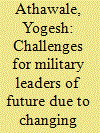

|
|
|
| 6 |
ID:
099161
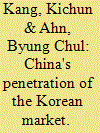

|
|
|
|
|
| Publication |
2010.
|
| Summary/Abstract |
China's penetration of the world market has been impressive. This paper uses highly disaggregated Korean import data (from 1992 to 2008) to examine China's penetration of the Korean market in the context of the composition of value (the extensive and intensive margins) and the product type (homogeneous and differentiated) in trade. The increase in Chinese imports has been attributed to the rapid increase in the import of new products (the extensive margin) and of existing products (the intensive margin). However, the growth rate of new products decelerated in the 2000s. The growth in the intensive margin was due to quantity, not price. Chinese imports to Korea did not improve over the period in terms of quality. Although Chinese products became cheaper, they were more differentiated over time. Welfare gains were realized through the expanded introduction of new products from China. However, much of the gains from Korea's Chinese product import boom were realized in earlier years (1992-2000) because even though imported products became more differentiated, the increase in the extensive margin was lower in more recent years (2001-2008).
|
|
|
|
|
|
|
|
|
|
|
|
|
|
|
|
| 7 |
ID:
131145
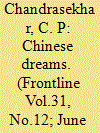

|
|
|
|
|
| Publication |
2014.
|
| Summary/Abstract |
Becoming another China is not easy as that will involve the reduction of expenditure on food subsidies and other welfare measures.
|
|
|
|
|
|
|
|
|
|
|
|
|
|
|
|
| 8 |
ID:
102626
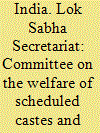

|
|
|
|
|
| Publication |
New Delhi, Lok Sabha Secretariat, 2009.
|
| Description |
8p.
|
| Series |
Parliamentary procedure abstract series; 20
|
|
|
|
|
|
|
|
|
|
|
|
Copies: C:1/I:0,R:1,Q:0
Circulation
| Accession# | Call# | Current Location | Status | Policy | Location |
| 055703 | 328.404/IND 055703 | Main | On Shelf | Reference books | |
|
|
|
|
| 9 |
ID:
099363
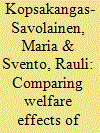

|
|
|
|
|
| Publication |
2010.
|
| Summary/Abstract |
We compare the welfare effects of different regulation schemes of electricity distribution utilities. The compared regulation schemes are Fixed Price regulation, Cost of Service regulation, Menu of Cost-Contingent Contracts and Simple Menu of Contracts. In our calculations we utilize the information of a firm's potential to improve cost efficiency. The firm-specific cost information of Finnish electricity distribution utilities is obtained by using various Stochastic Frontier models. Our basic result is that welfare can be improved by changing the Cost of Service regulation scheme to the Menu of Contracts regulation. Welfare also increases in the case of Fixed Price regulation and Simple Menu of Contract regulation. There is however, a significant difference among regulation regimes on how this improved welfare is distributed to consumers and producers.
|
|
|
|
|
|
|
|
|
|
|
|
|
|
|
|
| 10 |
ID:
171957
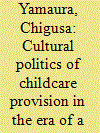

|
|
|
|
|
| Summary/Abstract |
The shortage of public childcare in Japan – called the “waitlisted children problem” (taiki jidō mondai) – has assumed increasing visibility and salience over the last several decades. This essay analyzes how this “waitlisted children problem” has been conceived, narrated, and addressed within the specific political, economic, and historical context that is contemporary Japanese society. Going beyond discussions of gender inequality in the workplace and home, the paper interrogates the cultural logics underpinning the recent urgency of debates over public childcare provision in Japan. The key to understanding these developments is recognizing how Japanese women's reproductive desires have become objectified within official and popular discussions as obstructed and requiring emancipation. Correspondingly, promoting gender equality by expanding childcare provision has become a tool of bio-political intervention, a means to remove a statistically calculated inhibition of women's reproductive desire. This links childcare with Japan's national survival, and thus helps to explain how both official and popular debates have converged in seeing the issue as significant and pressing.
|
|
|
|
|
|
|
|
|
|
|
|
|
|
|
|
| 11 |
ID:
102562
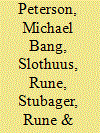

|
|
|
|
|
| Publication |
2011.
|
| Summary/Abstract |
Public attitudes towards welfare policy are often explained by political values and perceptions of deservingness of welfare recipients. This article addresses how the impact of values and perceptions varies depending on the contextual information that citizens have available when forming welfare opinions. It is argued that whenever citizens face deservingness-relevant cues in public debate or the media, a psychological 'deservingness heuristic' is triggered prompting individuals spontaneously to think about welfare policy in terms of who deserves help. This is an automatic process, equally influential among the least and the most politically sophisticated. Moreover, when clear deservingness cues are present, the impact of values on opinions vanishes. These arguments are supported by data from two novel experimental studies embedded in separate nationwide opinion surveys. The findings revise conventional wisdom of how values and heuristics influence public opinion and have major implications for understanding dynamics in aggregate welfare opinion and attempts from political elites to manipulate public opinion.
|
|
|
|
|
|
|
|
|
|
|
|
|
|
|
|
| 12 |
ID:
145560
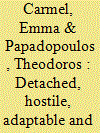

|
|
|
|
|
| Summary/Abstract |
In this article, we review the EU's significance for social policies in the UK. The EU has a limited legal role or institutional capacity to directly regulate the social policies of its member states. This role is even more limited in the case of non-eurozone countries. There are a handful of EU policy measures which have had effects on social policy in the UK. However, these effects have not changed the institutional arrangements for making, organising and delivering social policy, which remain firmly in the hands of UK governments. In consequence, a ‘Leave’ or ‘Remain’ result has relatively limited implications for social policy, except in the case of specific social groups: notably for UK and other EU nationals who have lived and worked in at least one other EU country. Other EU legislation and regulation is compatible with the current and historical policy preferences of UK governments and political parties.
|
|
|
|
|
|
|
|
|
|
|
|
|
|
|
|
| 13 |
ID:
107982
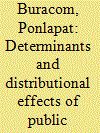

|
|
|
|
|
| Publication |
2011.
|
| Summary/Abstract |
Social spending in Thailand is allocated in response to several demand and supply factors. Globalization and inequality tend to compel the governments, both elected and nonelected, to increase generous education, health, and welfare programs for social sectors that fall behind. An increase in revenue from direct taxes and the previous year's spending level has also had a positive effect on the current rate of public spending on education, health, and welfare in Thailand. Overall public spending on education, health, and welfare is not very well targeted, despite the increase in the shares of education, health, and welfare spending and the recent introduction of new social programs in Thailand. These increases had the stated objective of increasing access of the poor to education, health, and welfare services, including an expansion of basic education from nine to twelve years, a student loan program, a universal health-insurance scheme, and the expansion of other welfare services. Public spending on basic education is primarily propoor, but the disparities in access to education continue to exist at all levels of education. Although the resulting benefit incidence of public spending on health services in 2007 was less prorich compared with the past, the majority of public health spending still favors higher income classes. The social security scheme coverage is also limited to a small section of the Thai labor force. These findings pose a challenge to policymakers, and the author therefore explores their policy implications.
|
|
|
|
|
|
|
|
|
|
|
|
|
|
|
|
| 14 |
ID:
159398
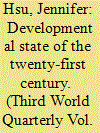

|
|
|
|
|
| Summary/Abstract |
As development is no longer simply conceived of as economic growth, but also as encapsulating human development, the role of the developmental state must be rethought. Focusing on the state’s ability to deliver collective goods such as welfare has become an important task for developing and developed nations alike, and nowhere is this more important than in China. Consequently, intimate connections between the political and industrial elites are no longer sufficient and may actually be counterproductive to the success of the developmental state. Diverging from traditional developmental states, China shows that incorporation of new stakeholders is not premised on principles of human development. The novelty that China brings to re-thinking and re-articulating a new developmental state framework is that the development state of the twenty-first century can create new alliances such as with non-governmental organisations to meet human development objectives, but substantive change with regards to how the state is organised is not a precondition.
|
|
|
|
|
|
|
|
|
|
|
|
|
|
|
|
| 15 |
ID:
177426
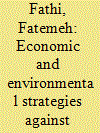

|
|
|
|
|
| Summary/Abstract |
This study sought to investigate the economic-environmental effects of Targeted Subsidy Policy on energy in the meat market of Iran within a game theory framework. The welfare of players in economic game, determined by equilibrium displacement model, and the environmental losses (benefits) from Greenhouse Gas emissions were considered as game payoffs based on the behavior of three players: producers, consumers, and government. Results show an increase in the piece of energy carriers as a policy deterred from enhancing environmental losses and reducing the welfare of each market player. Therefore, eliminating energy subsidy, and redistributing its revenue toward producers to improve technology are regarded as the government's strategy for economic-environmental equilibrium, while removing energy subsidy without repaying is considered as equilibrium strategy in which the effects of Targeted Subsidy Policy are only considered economically or environmentally.
|
|
|
|
|
|
|
|
|
|
|
|
|
|
|
|
| 16 |
ID:
191406
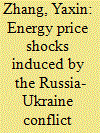

|
|
|
|
|
| Summary/Abstract |
The significant spike in global energy prices induced by the Russian-Ukrainian (RU) conflict is perceived as highly uncertain that may rise household living costs and adversely affect Sustainable Development Goals such as poverty elimination. However, the impacts on human wellbeing are entirely obscured by conventional economic analyses. Using the input-output price model and a human needs framework, we assess the impact of energy price shocks caused by the RU conflict on eight dimensions of human needs in 49 countries/regions. Our findings show that the non-material dimension Creation and the material dimension Protection are the most affected human needs globally, with declines of 3.7%–8.5% and 3.6%–8.4%, respectively. Households in BRICS countries are hit hardest on these human needs (2.0-2.2 times the global average) owing to higher price increases and higher energy-dependent consumption patterns. The human need satisfaction of low-income groups is not only severely affected, but also the poorer the country in which they reside, the more serious the decline of their satisfaction, while there is no such problem for higher income groups. Our findings underscore the need to consider both material and frequently overlooked non-material dimensions of wellbeing when designing targeted policies to protect the vulnerable from energy price shocks.
|
|
|
|
|
|
|
|
|
|
|
|
|
|
|
|
| 17 |
ID:
182748
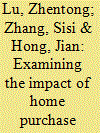

|
|
|
|
|
| Summary/Abstract |
This paper studies the impact of home purchase restrictions on China's housing market. We estimate a structural model of household preference for housing, real estate developers' pricing decisions, and equilibrium market outcome in five large cities. By comparing the estimation results from pre- and post-policy intervention, we find that, after home purchase restrictions are implemented, overall housing demand in most cities becomes weaker and less price elastic; meanwhile, real estate developers face higher holding costs and thus are willing to lower prices and sell more quickly. Counterfactual analyses show that in some cities alternative policy designs that cause less structural change of demand could achieve larger consumer welfare and social welfare than the implemented policy.
|
|
|
|
|
|
|
|
|
|
|
|
|
|
|
|
| 18 |
ID:
149257
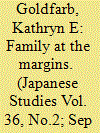

|
|
|
| 19 |
ID:
100996
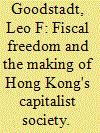

|
|
|
|
|
| Publication |
2010.
|
| Summary/Abstract |
Fiscal autonomy is a defining principle of China's arrangements for Hong Kong's postcolonial administration and was a major feature of British rule before 1997. This article begins with a discussion of how this colony achieved unusual freedom from London's usual oversight of colonial governments. After rejecting Colonial Office demands for a modern income tax, Hong Kong stuck to the principle of "low tax, small government," defying London's repeated calls for increased public expenditure on social development while resisting local business pressures for subsidies and tax concessions. The analysis then identifies fiscal freedom's contribution to Hong Kong's growth as an international financial center. The discussion explains the link between Hong Kong's unfashionable fiscal conservatism in the 1950s and 1960s and the buildup of government reserves to a level which permitted Hong Kong to control its own monetary affairs, including an independent currency. The final section assesses the gains and losses, both economic and social, which accompanied this fiscal independence. The analysis makes extensive use of unpublished archival material.
|
|
|
|
|
|
|
|
|
|
|
|
|
|
|
|
| 20 |
ID:
121112
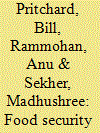

|
|
|
|
|
| Publication |
2013.
|
| Summary/Abstract |
Contemporary India possesses a food security paradox-progress in combating food insecurity is occurring at a slower pace than might be expected, given the nation's rapid economic growth. This paper provides a conceptual framework to explain this phenomenon. Drawing on the work of Amartya Sen, it uses a broadly framed analysis to conceptualise the problem in terms of the interactivity between three types of entitlement failure. Firstly, pure exchange system entitlement (abilities to obtain food from welfare programmes) has been curtailed by institutional shortcomings in pivotal programmes. Secondly, opportunities for wage-labour entitlement (abilities to obtain food from monetary incomes) have been restricted for vulnerable households because of the sequencing and geographical patterning of recent economic growth in India. Thirdly, opportunities for vulnerable households to address their needs through own-production entitlement (abilities to grow one's own food) have been curbed by land fragmentation and environmental degradation. These interactions have created vicious cycles of food insecurity for vulnerable households. Through this approach, the deeper causal roots of India's food security paradox are articulated, thus underscoring the importance of multi-pronged, holistically constructed policy agendas.
|
|
|
|
|
|
|
|
|
|
|
|
|
|
|
|
|
|
|
|
|